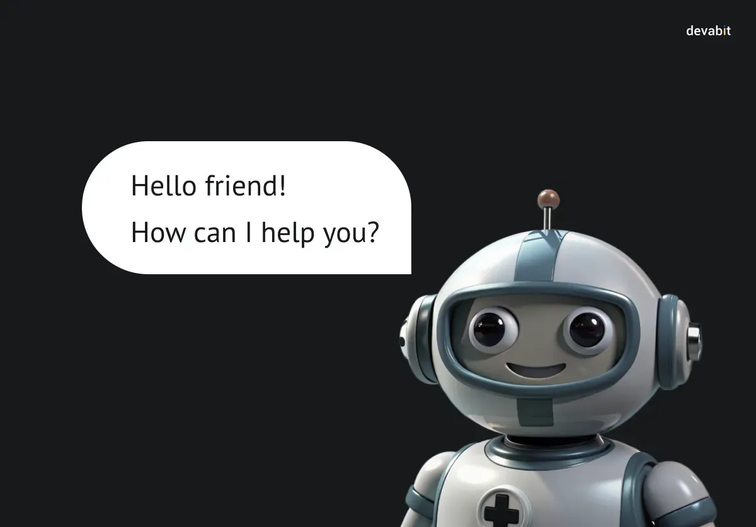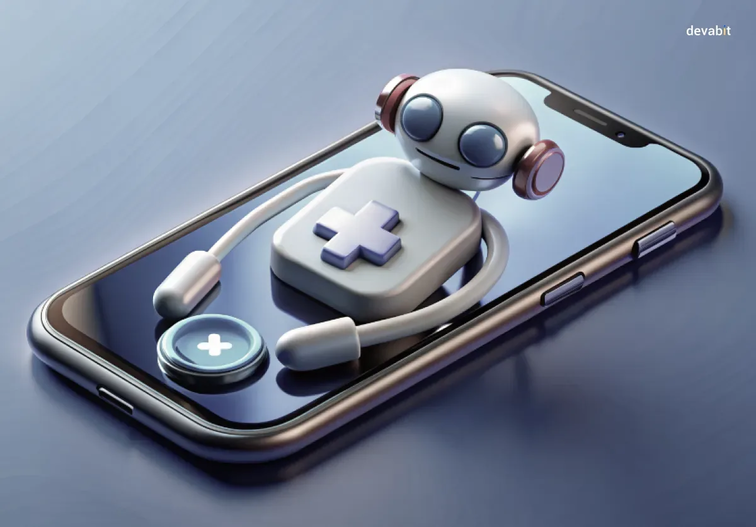Conversational AI for Healthcare: Beyond Bots’ Assistance
Nowadays, global digitalization is affecting all industries of our lives, from car repair to banking and economics. Fortunately, the healthcare industry is not an exception. Conversational AI for healthcare, once a futuristic concept, has rapidly transformed the way people get assistance with various health issues. This technology, through chatbots, virtual assistants, and AI-driven communication platforms, is not just reshaping how we access medical services but is also improving patient engagement and support.
Conversational AI in healthcare offers a more personalized and efficient medical experience. Moreover, it has become a real bridge between medical professionals and patients across the globe and has made healthcare services accessible to everyone.
Today, every custom healthcare software development company should develop all needed technologies, including chatbots, AI communication platforms, and AI assistants, so clinics can provide round-the-clock patient support and build a responsive healthcare ecosystem. For instance, our experienced devabit team has years of experience in developing AI solutions for various business industries.
Join us as we explore every aspect of conversational AI in healthcare, its current impact, the challenges it navigates, and the future it promises. We will tell you not only about the technology itself but also about how it simplifies the business process for healthcare providers, where every patient interaction is valued and every communication can make a difference.

- Conversational AI for Healthcare: What It Is & How It Works
- The Main Features of Conversational AI for Healthcare
- Benefits of Conversational AI for Healthcare
- Some Challenges of Conversational AI for Healthcare
- The Future Predictions of Conversational AI for Healthcare
- devabit — Your Assistant in the Healthcare World
Conversational AI for Healthcare: What It Is & How It Works
Due to the constant development of various AI technologies, it becomes more difficult to keep everything in mind. Now we will clarify the concept of conversational AI for healthcare and tell you more about its definition and main working principles that make healthcare services accessible to all people.
Definition and Types
Conversational AI for healthcare refers to the use of artificial intelligence systems to simulate human conversation, providing the interaction between humans and machines in a way that is quite similar to real-life communication. Such AI systems are specially educated in order to assist people with various health issues and give fast answers to their questions every time they need help.
It is important to keep in mind that conversational AI does not replace the real doctor’s consultations and advice. Before taking some serious measures, patients should always contact medical assistants and ensure that their actions are harmless. Overall, this technology is primarily manifested in two forms: chatbots and virtual health assistants.
Chatbots
The important elements of conversational AI for healthcare are chatbots. They are AI-driven programs developed to interact with patients through text- or voice-based conversations. Chatbots can handle a wide range of tasks, from answering general health queries to scheduling appointments. They operate on a 24/7 basis, ensuring that help is always available. It significantly reduces wait times and improves patient satisfaction.

A study by Juniper Research predicted that chatbots could lead to annual cost savings of over $3.7 billion for the healthcare industry by 2023, showcasing their potential to significantly reduce the workload on medical staff and improve operational efficiency.
Virtual Health Assistants
Virtual health assistants (VHAs) go a step further by offering more personalized support. These AI-driven assistants can help manage chronic conditions, remind patients to take their medication, support them through recovery processes, and provide various health education programs.
According to a report by Accenture, the use of VHAs could save the U.S. healthcare system an estimated $150 billion annually by reducing the time professionals spend on administrative tasks and allocating it to direct patient care.

How It Works
The working process of conversational AI for healthcare is not as complicated as it seems. At the heart of conversational AI's functionality are two core technologies: natural language processing (NLP) and machine learning (ML). These technologies collaborate to interpret and engage in human-like conversations.
Natural Language Processing
NLP enables machines to understand human language as it is spoken or written. It involves the decomposition of language into more manageable elements for analysis, ensuring the AI can grasp the meaning, context, and sentiment behind user inputs.
A crucial aspect of NLP is its ability to discern nuances in human language, including slang, idioms, and regional dialects, making conversational AI for healthcare more inclusive and accessible. With such adaptability, AI technologies can address the diverse and complex nature of health-related inquiries that impact patient satisfaction rates.

Machine Learning and AI Algorithms
Machine learning and AI algorithms are responsible for the continuous improvement and personalization of conversational AI for healthcare. By analyzing data from various interactions, these algorithms identify patterns, predict user needs, and refine responses to ensure relevance and accuracy.
An interesting case of AI's potential in healthcare is evident in the achievements of Google's DeepMind Health project, which has successfully predicted acute kidney injuries up to 48 hours before they occur, demonstrating the life-saving capabilities of AI in predicting and preventing adverse health events.
The Main Features of Conversational AI for Healthcare
Conversational AI for healthcare is developing extremely fast. It explores new features every year and becomes a real multifunctional technology that is not afraid to face any health issue. From improving direct patient interactions to providing personalized care plans and educational programs, conversational AI for healthcare is being developed to improve the quality and accessibility of healthcare services.
Let us tell you more about the crucial features of conversational AI for healthcare and why it is impossible to imagine this technology without them.
Patient Engagement and Support
The main feature of conversational AI is, undoubtedly, providing a high level of patient support. Through interactive chatbots and virtual assistants, patients receive timely reminders for medication, appointments, and follow-up care. It significantly reduces the likelihood of missed treatments.
A study by the National Center for Biotechnology Information found that engagement rates with health apps and platforms saw a 50% increase when conversational AI elements were integrated. This feature is highly important in creating a continuous care model, extending the reach of healthcare providers to every corner of the globe.

Personalized Healthcare
Personalization is at the heart of conversational AI for healthcare, with algorithms that are developed to adapt to individual patient needs and preferences. These systems analyze patient interactions, health records, and other relevant data to deliver customized health recommendations, treatment options, and wellness advice.
An interesting fact from a Deloitte report suggests that personalized health interventions powered by AI can lead to a 40% improvement in patient outcomes. This data shows how globally important the technology of conversational AI for healthcare really is.
Mental Health Assistance
Conversational AI's ability to provide immediate, stigma-free, and accessible mental health support is one of its most impactful features. AI-powered platforms offer therapeutic conversations, coping strategies, and crisis intervention, catering to the urgent need for mental health resources.

The World Health Organization reports a global shortfall of approximately 1.18 million mental health professionals, a gap that conversational AI is poised to fill. By offering an anonymous and readily available avenue for support, these AI systems play a crucial role in de-escalating mental health crises and providing early intervention, illustrating the technology's critical role in public health.
Operational Efficiency
The automation of routine administrative tasks is another significant feature of conversational AI for healthcare that has a significant impact on cost savings and the overall workflow process. By handling patient intake forms, appointment scheduling, and insurance verification, AI frees up valuable time for healthcare professionals to focus on patient care.
According to a study by Accenture, automation and AI could cut healthcare costs by 20% by boosting administrative processes. This not only optimizes the use of resources but also improves the overall patient and provider experience by minimizing wait times and bureaucratic hurdles.
Benefits of Conversational AI for Healthcare
The implementation of conversational AI for healthcare is noticeably improving the way these services are delivered to patients across the globe. Of course, the benefits of such technologies are countless, but we highlighted three of the most significant ones that have an irreplaceable impact on the overall healthcare industry.

Improved Patient Experience
One of the most immediate benefits of conversational AI is the noticeable improvement in patient experience. By providing 24/7 support and instant responses to patient inquiries, conversational AI for healthcare reduces wait times and improves patient satisfaction rates. A survey conducted by Oracle revealed that 64% of people trust a chatbot to handle their healthcare inquiries more than or as much as a human.

Of course, conversational AI can offer personalized attention, timely reminders for medication and appointments, and instant support, thereby elevating the overall patient experience. But we strongly emphasize the importance of the fact that people should not completely trust the chatbots’ recommendations without consulting a doctor first. Patients always need to check the reliability of the chatbots they use.
Healthcare Accessibility Around the World
By breaking down language and geographical barriers, conversational AI for healthcare allows patients in remote or underserved areas to receive medical advice and support. The World Health Organization (WHO) has highlighted the potential of digital health technologies, including AI, to close the health access gap, especially in low- and middle-income countries.
For instance, AI-powered apps are being used to deliver maternal health advice in regions with high infant and maternal mortality rates, demonstrating the technology's potential to save lives by making critical health information more accessible.

Cost-Effectiveness
The cost-effectiveness of conversational AI for healthcare is another significant benefit, with the potential to save billions of healthcare costs globally. By automating routine tasks, such as appointment scheduling, patient triage, and answering frequently asked questions, conversational AI reduces the workload on healthcare staff, allowing them to focus on more complex and critical patient care tasks.

A report by Accenture estimates that key clinical health AI applications can potentially create $150 billion in annual savings for the US healthcare economy by 2026. It sounds impressive, doesn’t it?
Some Challenges of Conversational AI for Healthcare
Of course, conversational AI for healthcare provides lots of benefits and opportunities, but at the same time, patients and medical assistants may face some difficulties and challenges during the working process. Below, we will describe two of the most common problems that conversational AI for healthcare can bring.
Data Security
Undoubtedly, the integration of conversational AI for healthcare implies the handling of sensitive personal and medical information. This raises significant data security issues, as the breach of such data could have devastating consequences for patients' privacy and trust in the healthcare system. The Cost of a Data Breach Report by IBM Security revealed that the healthcare industry faces the highest costs from data breaches, with an average of $7.13 million per incident.
Protecting this data requires a complicated approach, including state-of-the-art encryption, secure data transmission protocols, and maintenance of stringent regulatory standards like the Health Insurance Portability and Accountability Act (HIPAA) in the U.S. Moreover, educating patients and staff about data security practices is essential to protecting this information against cyber threats.

Accuracy and Reliability
It is obvious that any misinformation can lead to adverse health outcomes, including misdiagnosis, inappropriate treatment recommendations, or unnecessary anxiety for patients. The variability in the performance of AI-driven symptom checkers, as noted in a study published in "Nature Medicine," highlights the potential risks associated with reliance on these tools without solid validation and oversight.
Custom healthcare software development companies should always ensure the accuracy of conversational AI systems by implementing continuous learning practices from diverse, up-to-date medical datasets, along with testing programs that align with medical standards. Furthermore, the involvement of healthcare professionals in reviewing and supervising AI recommendations is critical to maintaining the reliability and trustworthiness of these systems.
To overcome these challenges, AI developers, healthcare professionals, and patients should always cooperate with each other and share their experiences. This collaborative approach may assist in overcoming a lot of challenges along the way and making the healthcare system better.
The Future Predictions of Conversational AI for Healthcare
As we look to the future, the potential of conversational AI for healthcare is quite promising. With the future development of AI and machine learning technologies, we will notice a growing set of conversational AI capabilities, making them more intuitive and effective in delivering personalized healthcare services.
Future conversational AI systems will offer even more personalized healthcare experiences. These systems will not only understand medical histories but will also incorporate social determinants of health, lifestyle factors, and patient preferences. In addition to this, the integration of conversational AI for healthcare with wearable health devices and the Internet of Things will provide the ability for real-time health monitoring. Due to this, patients will receive instant feedback and recommendations based on their health data collected from wearable devices.

With improvements in NLP and machine learning algorithms, conversational AI for healthcare will play a significant role in preliminary diagnosis and triage, guiding patients to the appropriate level of care more accurately. This will help reduce unnecessary medical visits and boost the workflow process. Moreover, the technology of conversational AI for healthcare will be used for providing mental health support, with systems developed to detect nuances in mood and speech patterns.
All in all, as conversational AI technologies become more accessible and affordable, they will play a crucial role in bridging the healthcare access gap worldwide, especially in underserved and rural areas. This democratization of healthcare through technology will significantly impact global health equity.
devabit — Your Assistant in the Healthcare World
As you can see, AI technologies are developing extremely fast. All you need to do to stay afloat in the rapidly evolving digital market is to implement modern technologies into your business models. And conversational AI for healthcare is not an exception. At the same time, every custom healthcare software development company has to provide all needed technologies, including chatbots, AI communication platforms, and AI assistants, so clinics can offer 24/7 patient support and build a responsive healthcare ecosystem.
The devabit team has years of experience in developing conversational AI healthcare solutions for various business industries. Our AI platforms are crafted to meet the unique needs of each healthcare provider, ensuring smooth integration into your existing workflows and systems. With devabit, you get a solution that truly understands and responds to the specific challenges and opportunities of your practice.
Do not hesitate to contact us whenever you need our assistance. Engage your patients like never before with 24/7 support, real-time health monitoring, and personalized communication with devabit’s AI solutions! The future of healthcare is AI-driven, and with devabit, you are always one step ahead!

Recent Publications
Don't miss out! Click here to stay in touch.
Discover More

Relevant Articles View all categories
View all categories CONNECT WITH US WE’RE READY
TO TALK OPPORTUNITIES
THANK YOU! WE RECEIVED YOUR MESSAGE.
Sorry
something went wrong



